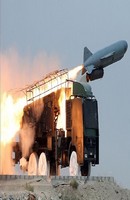Is Iran an Existential Threat or a Strategic One?
19:08 - 5 January 2012

For more than a decade the United States and some European countries have imposed economic sanctions and threatened military operation against Iran with the goal of stopping its alleged nuclear weapons development program. Proponents of sanctions and the military option offer two justifications for why Iran\'s nuclear program must be stopped at all costs. First, they argue that a Nuclear Iran will pose an existential threat to Israel. Second, it will pose a strategic threat to Israeli and Western interests in the region. While the media has given ample coverage to Iran\'s nuclear activities and the actions of Western governments to stop it, there has been little debate about the validity of these two claims. The media takes it as given that Iran\'s nuclear Program must be stopped at all cost. Very little is being said about exactly how and why a nuclear Iran can wage war against Israel. Even the scholars and experts who comment on this issue rarely offer a viable scenario on how this existential threat will materialize.
Another reason for lack of serious debate about the nature of Iran\'s threat to Israel and the West is that Iran has steadfastly denied any intention to develop nuclear weapons. As a result Iran cannot participate in any debate on the threat that its potential nuclear arsenal can pose to other countries. Iran cannot even present its case for why it might need nuclear deterrence because doing so would amount to admitting that it has nuclear weapon ambitions.
No one believes Iran\'s claim that it is only interested in nuclear technology for peaceful energy uses. Although there is no hard evidence about motives behind Iran\'s program, it is rational to speculate that Iran is trying to develop a nuclear deterrence. Desire for such a deterrence was reinforced after the 1980 Iraqi Invasion against Iran that resulted in the eight-year Iran-Iraq war. Iran is also worried about imbalance of power with Nuclear Pakistan. This deterrence capability not only gives Iran a sense of security but it also allows Iran to enjoy what political dissident Akbar Ganji calls Quest for Nuclear Greatness (Azamat-talabi Atomi), by which he means seeking international prestige and regional influence by becoming a nuclear power.
The fact remains that even if Iran develops nuclear weapons its resources are limited and it can develop only a small arsenal of ten or less warheads. This small nuclear force will pose a strategic threat to Western and Israeli interests in the region but it will not pose an existential threat to any country. Despite the harsh rhetoric of President Ahmadinejad against Israel, it is unimaginable that immediately after acquiring a few nuclear warheads Iran will launch a nuclear attack against Israel. Iran is well aware of Israel\'s nuclear capabilities and the U.S. nuclear support for Israel. An attack against Israel will be equivalent to committing national suicide and bringing about total destruction of Iran. The only scenario under which Iran can pose an existential threat to Israel is if the leadership of Iran is irrational and is willing to commit national suicide for sake of hurting Israel. However, there is no evidence that the Islamic regime is irrational or seeks collective martyrdom. In the past thirty years, for example, while agitating the United States in Iraq, Afghanistan and many other places, Iran has carefully avoided a direct military confrontation with the United States which would have resulted in its own defeat.
Some Israeli and American politicians have acknowledged this fact already. Several high rankingIsraeli politicians and Intelligence officials, such as current director of Mossad, Tamir Pedro, have rejected the notion that a nuclear Iran poses an existential threat to Israel. These alternative opinions, however, have so far failed to promote a well-deserved, open and informed debate on this issue in the United States. Perceptions of policy makers and public in the U.S. and Israel on whether or not Iran poses an existential threat to Israel will play a crucial role in how both countries will respond to Iran\'s nuclear activities. Unfortunately, a large portion of Israeli public and Jewish community in the United States is convinced that Iran will pose an existential threat to Israel. This perception could push Israel toward military action against Iran which carries a high risk of resulting in a full scale war between the two nations.
If Iran does not pose an existential threat to Israel or other countries then one must ask whether a military attack or paralyzing economic sanctions, which will cause considerable human suffering, can be morally justified. At the same time one cannot ignore the fact that a nuclear Iran will pose a strategic threat to Israel, the United States and its Arab neighbors. The most obvious strategic threat that worries Israel is that Iran will become bolder in its support of Hamas and Hezbollah. If these groups become stronger they can increase the cost of occupation for Israel but they can hardly pose an existential threat. In other words Iran will offer them more conventional weapons and financial support but it will never supply them with nuclear weapons because it knows that the U.S. and Israel will retaliate against Iran if any of these groups use nuclear weapons against Israel. The ability of Iran to support Hamas and Hezbollah however, will depend however, on survival of the Bashar Assad regime in Syria which now faces a very uncertain future.
Another likely consequence of a nuclear Iran is that it will provoke Turkey and larger Arab countries to seek nuclear weapons of their own and the result will be more proliferation. Saudi Arabia, in particular, is highly worried about a nuclear Iran and it might not be content with living under the U.S. security umbrella. It might instead try to acquire nuclear weapons through Pakistan. Proliferation of nuclear weapons to the region will not necessarily result in war and nuclear exchange. Most likely it will lead to a balance of terror and low level proxy wars among the client organizations of the nuclear states. Just as Pakistan and India have not fought a major war ever since Pakistan developed nuclear weapons, a nuclear Iran and a nuclear Saudi Arabia will come to the conclusion that war will no longer be an option.
Proliferation of Nuclear weapons to Turkey and Arab countries, however, will be highly undesirable for Israel and the U.S. because it will challenge both countries\' military superiority over other Middle Eastern countries. Spread of nuclear weapons to several Middle Eastern countries will make it very costly if not impossible for the United States to maintain hegemony over the region in accordance to the Carter Doctrine. Similarly, nuclear empowerment of any Arab country (in response to Iran) will diminish the imbalance of power between Arabs and Israel. As a result it will increase Israel\'s cost of controlling the lands that it captured in 1967 war. The reason being that a nuclear Arab country will be able to support Hamas and other anti-Israeli groups without fear of military retaliation by Israel.
Overall, even if Iran develops a nuclear capability it will be a small arsenal that could not pose an existential threat to any country in the region. At worse, it will pose a strategic threat at the regional level and encourage other Middle Eastern countries to seek nuclear capabilities of their own. Such a challenge should be met with diplomatic initiatives and comprehensive regional security arrangements rather than with preemptive wars and military strikes.
Opinion article by Nader Habibi (originally published by opednews.com)
About the author: Nader Habibi is the Henry J. Leir Professor of the Economics of the Middle East at Brandeis University\'s Crown Center for Middle East Studies. His research has focused on economic and financial conditions of oil-exporting Middle Eastern countries, particularly Iran and the GCC Countries.
Another reason for lack of serious debate about the nature of Iran\'s threat to Israel and the West is that Iran has steadfastly denied any intention to develop nuclear weapons. As a result Iran cannot participate in any debate on the threat that its potential nuclear arsenal can pose to other countries. Iran cannot even present its case for why it might need nuclear deterrence because doing so would amount to admitting that it has nuclear weapon ambitions.
No one believes Iran\'s claim that it is only interested in nuclear technology for peaceful energy uses. Although there is no hard evidence about motives behind Iran\'s program, it is rational to speculate that Iran is trying to develop a nuclear deterrence. Desire for such a deterrence was reinforced after the 1980 Iraqi Invasion against Iran that resulted in the eight-year Iran-Iraq war. Iran is also worried about imbalance of power with Nuclear Pakistan. This deterrence capability not only gives Iran a sense of security but it also allows Iran to enjoy what political dissident Akbar Ganji calls Quest for Nuclear Greatness (Azamat-talabi Atomi), by which he means seeking international prestige and regional influence by becoming a nuclear power.
The fact remains that even if Iran develops nuclear weapons its resources are limited and it can develop only a small arsenal of ten or less warheads. This small nuclear force will pose a strategic threat to Western and Israeli interests in the region but it will not pose an existential threat to any country. Despite the harsh rhetoric of President Ahmadinejad against Israel, it is unimaginable that immediately after acquiring a few nuclear warheads Iran will launch a nuclear attack against Israel. Iran is well aware of Israel\'s nuclear capabilities and the U.S. nuclear support for Israel. An attack against Israel will be equivalent to committing national suicide and bringing about total destruction of Iran. The only scenario under which Iran can pose an existential threat to Israel is if the leadership of Iran is irrational and is willing to commit national suicide for sake of hurting Israel. However, there is no evidence that the Islamic regime is irrational or seeks collective martyrdom. In the past thirty years, for example, while agitating the United States in Iraq, Afghanistan and many other places, Iran has carefully avoided a direct military confrontation with the United States which would have resulted in its own defeat.
Some Israeli and American politicians have acknowledged this fact already. Several high rankingIsraeli politicians and Intelligence officials, such as current director of Mossad, Tamir Pedro, have rejected the notion that a nuclear Iran poses an existential threat to Israel. These alternative opinions, however, have so far failed to promote a well-deserved, open and informed debate on this issue in the United States. Perceptions of policy makers and public in the U.S. and Israel on whether or not Iran poses an existential threat to Israel will play a crucial role in how both countries will respond to Iran\'s nuclear activities. Unfortunately, a large portion of Israeli public and Jewish community in the United States is convinced that Iran will pose an existential threat to Israel. This perception could push Israel toward military action against Iran which carries a high risk of resulting in a full scale war between the two nations.
If Iran does not pose an existential threat to Israel or other countries then one must ask whether a military attack or paralyzing economic sanctions, which will cause considerable human suffering, can be morally justified. At the same time one cannot ignore the fact that a nuclear Iran will pose a strategic threat to Israel, the United States and its Arab neighbors. The most obvious strategic threat that worries Israel is that Iran will become bolder in its support of Hamas and Hezbollah. If these groups become stronger they can increase the cost of occupation for Israel but they can hardly pose an existential threat. In other words Iran will offer them more conventional weapons and financial support but it will never supply them with nuclear weapons because it knows that the U.S. and Israel will retaliate against Iran if any of these groups use nuclear weapons against Israel. The ability of Iran to support Hamas and Hezbollah however, will depend however, on survival of the Bashar Assad regime in Syria which now faces a very uncertain future.
Another likely consequence of a nuclear Iran is that it will provoke Turkey and larger Arab countries to seek nuclear weapons of their own and the result will be more proliferation. Saudi Arabia, in particular, is highly worried about a nuclear Iran and it might not be content with living under the U.S. security umbrella. It might instead try to acquire nuclear weapons through Pakistan. Proliferation of nuclear weapons to the region will not necessarily result in war and nuclear exchange. Most likely it will lead to a balance of terror and low level proxy wars among the client organizations of the nuclear states. Just as Pakistan and India have not fought a major war ever since Pakistan developed nuclear weapons, a nuclear Iran and a nuclear Saudi Arabia will come to the conclusion that war will no longer be an option.
Proliferation of Nuclear weapons to Turkey and Arab countries, however, will be highly undesirable for Israel and the U.S. because it will challenge both countries\' military superiority over other Middle Eastern countries. Spread of nuclear weapons to several Middle Eastern countries will make it very costly if not impossible for the United States to maintain hegemony over the region in accordance to the Carter Doctrine. Similarly, nuclear empowerment of any Arab country (in response to Iran) will diminish the imbalance of power between Arabs and Israel. As a result it will increase Israel\'s cost of controlling the lands that it captured in 1967 war. The reason being that a nuclear Arab country will be able to support Hamas and other anti-Israeli groups without fear of military retaliation by Israel.
Overall, even if Iran develops a nuclear capability it will be a small arsenal that could not pose an existential threat to any country in the region. At worse, it will pose a strategic threat at the regional level and encourage other Middle Eastern countries to seek nuclear capabilities of their own. Such a challenge should be met with diplomatic initiatives and comprehensive regional security arrangements rather than with preemptive wars and military strikes.
Opinion article by Nader Habibi (originally published by opednews.com)
About the author: Nader Habibi is the Henry J. Leir Professor of the Economics of the Middle East at Brandeis University\'s Crown Center for Middle East Studies. His research has focused on economic and financial conditions of oil-exporting Middle Eastern countries, particularly Iran and the GCC Countries.



